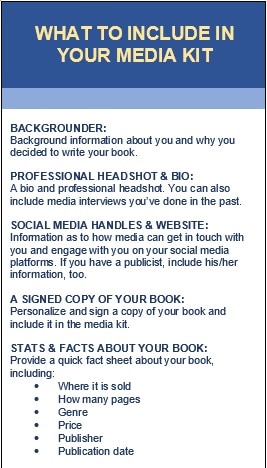
Generating Buzz About Your Nonfiction Book
GENERATING BUZZ ABOUT YOUR NONFICTION BOOK
What’s on your list of dreams you want to fulfill and goals you want to achieve in your lifetime?
Is writing a book on the top of your bucket list?
Maybe you aspire to write about your life experiences, a topic that interests you, or something you’re knowledgeable about.
While that’s all fine and good, how are you going to distinguish your book from the millions of books that are published every day?
To successfully launch your book, you’ve got to invest some time, energy, and money into its promotion, so you can share what you have to say with as many people as possible. But how?
Understand Publicity and What It Entails

Publicity, defined as creating awareness of something through media coverage, is an important part of your promotion strategy.
Simply sending out a press release about your book and hoping it gets noticed is not a strategy that’s going to work. You need to have a firm understanding of what goes behind an effective publicity campaign before you can launch one.
Here are some “tricks of the trade” when it comes to executing on your public relations plan.
Position yourself as a subject matter expert.
Book promotion, especially in the nonfiction world, is a lot about the author and not so much about the book.
Look for ways to get exposure as a thought leader on the particular topic at hand. These media opportunities often serve as a way to mention your book while, at the same time, building your credibility.
An excellent resource for this is Help A Reporter Out, which connects journalists seeking to include expertise in the their content with sources who have that expertise.
Just sign up for an account, receive email inquiries based on your preferences, and respond to them, suggesting that you would be an excellent resource for the article a journalist is working on.
You may not always get a response, but nothing ventured, nothing gained.
A word to the wise, though: If you do receive an inquiry, be sure to respond quickly. Editors and writers are often on deadline and need to be able to quickly turn stories and articles.
Know the art of a good pitch.
A pitch isn’t a press release. A pitch is a short note to a member of the media suggesting a story idea or a subject matter expert for a show or feature article.
It needs to be short, sweet, and to the point, because those in the media, especially now, have limited time to weed through a lengthy email.
When you do craft a pitch, take time to study what the journalist has covered previously. Doing this legwork will increase the likelihood of getting a response.
The media work hard, and they appreciate knowing their stories are being seen, heard, and watched. And even more, they appreciate your pitch landing in the right email inbox!
Define your audience.
Knowing your audience is Publicity 101.
Clearly define who needs to read your book so that you’re targeting the right media and journalists with your promotion efforts.
Your list should include TV news outlets, newspapers, magazines, and digital publications. Podcasts also provide a great platform, especially for subject matter experts, and have grown in popularity in recent years.
Take advantage of observances, holidays, and other events.
Take some time to focus on key events, observances, and holidays where you can position yourself as a subject matter expert.
For example, maybe you’ve written a book about family dynamics. With the holidays approaching, you might be the perfect expert for an article, TV segment, or radio interview on how to handle stressful conversations at the dinner table.
Or maybe you’ve written a book on adoption. Media outlets might be looking for experts to address how to navigate the adoption journey for National Adoption Day.
The news media are always looking for sources to include in stories that tie into timely news topics. And, luckily, there is virtually a day for everything. Use these observances to pitch yourself as an authority on a particular subject as a way to plug your book.
Give away your books.
Media outlets love giveaways and contests because they drive more traffic to their websites, initiate more call-ins, and engage listeners, readers, and viewers.
Sign a few copies of your books and use them to help get the word out.
Write a good press release.
While publicity isn’t just about issuing a press release, it is an essential piece of a public relations campaign.
But just because you’re a book writer doesn’t mean you know how to write a press release.
A press release is written in a particular format and style. Journalists can see right through someone who knows how to write one and someone who thinks they know how to write one.
If you’re not sure how to write one, it might be a good idea to hire a professional writer to help.
Send a media kit.
Editors and reporters receive thousands of emails every single day and don’t have time to wade through them all.
You might consider sending a personalized media kit in the mail with a copy of your book and some background information, including a bio, professional headshot, and other information relating to you, the topic, and your book.
These days, so much is done digitally that receiving an actual package may quickly set you apart from the competition.
Make your book newsworthy.
Lots of people write nonfiction books, and millions are published every year. So, what makes your book different or unique?
Take time to brainstorm with someone else who is not familiar with the book. An outside perspective sometimes helps define what makes a story newsworthy.
Watch and read the news.
We know that consuming too much news is not the best thing for us right now. However, you need to absorb enough of it so you have a good understanding of what’s trending and where your expertise could fit in.
Promote early and often.
It’s best to start publicizing your book about six months to a year before you publish it. If this isn’t possible, you need to begin promoting it as soon as you have a book deal.
By creating a buzz about it before it goes on sale, you will attract readers and make them excited for its release.
Plus, it takes time to initiate, create, and execute any publicity strategy, so you want to have plenty of time to develop press materials.
Remember that publicity is a marathon, not a sprint. It takes perseverance, patience, and mental toughness to do publicity of any kind.
Other Tools Besides Publicity
Promote on social media.
Besides promoting your book via the news media, social media is another avenue where you will want to invest some time.
Consider launching a website, and establishing accounts through Twitter, Facebook, and LinkedIn. And, once you have those accounts, be sure to post new content regularly.
You will also need to engage with your followers by responding to comments and reviews. It’s called “social media” for a reason, and people will expect some level of interaction.
Another great way to capitalize on social media is to follow journalists and trendsetters on their pages. Occasionally you might catch someone looking to interview a source with your area of expertise.
Take it on tour.
Nothing gets the word out about your book quite like doing a book tour.
Consider hosting in-person tours and doing book signings as a way to raise awareness about your upcoming book launch.
These days, especially now as we continue to grapple with the pandemic, the idea of hosting a “virtual” book tour is also catching on. According to the Nonfiction Author’s Association, a virtual book tour is a promotion where you schedule two to four weeks and put yourself on “tour” to help gain visibility ahead of your actual book launch.
Consider hiring a publicist.
You thought writing the book was the hard part. That is only one piece of it.
Public relations is tedious work. It takes time to craft the appropriate materials, research the correct journalists, pull together a media list, and distribute your press release. And then, you need to follow up and follow up again.
If you would prefer to delegate this task to a publicist, it is recommended that you find one with experience specifically in book publicity.
You’ve launched a nonfiction book. Now what?
You completed an item on your bucket list. You wrote a book about a topic you’re passionate about, and you created a buzz about it.
Now that you’ve laid the foundation, you need to continue your efforts by looking for avenues to publicize your expertise as a chance to mention your book whenever you can.
Just as with any public relations campaign, you need to sustain the publicity so you can remain top of mind and be well-positioned for when you decide to write your second book.
Related Content
- 0 Comment
Subscribe to Newsletter
- How Can SharePoint Be Used To Organize and Disseminate SOPs?
- Planning the Perfect Genealogy Research Trip: A Step-by-Step Guide
- From Silly to Awesome: How Words Change Meaning Over Time
- The Psychology of Font Choice: How Typography Impacts Content Engagement
- How to Distribute SOPs for Maximum Usability





